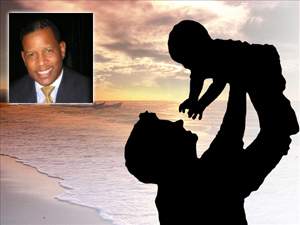Black America’s painful epidemic: Children without fathers
By J. A. Salaam -Guest Columnist- | Last updated: Jun 19, 2013 - 6:08:20 PMWhat's your opinion on this article?

|
But, for many Black men and their offspring across America, this experience is only a dream because large numbers of Black men are not blessed to be in the home with their children, nor in their lives.
Unfortunately, there are millions of instances where the absence of a father contributes to generations of children who grow up with broken dreams, lonely moments, staring out of windows waiting for dad to show up, or looking up in the stands during graduation or sporting events. They are hoping to see dad cheer them on. These painful realities are case studies of children who are not connected to their fathers.
According to Dr. Frances Cress-Welsing, a well-renowned Black psychiatrist who recently spoke at the Better Family Life Educational Culture Center in St. Louis, Black families are in a crisis situation by design. White-dominated society works to purposely disconnect Black fathers from their families, she said. So more often than not, children are left to get caught up in a bitter cycle of poverty, high school-drop out, drugs, and gang violence. No father is there to help them navigate through difficult circumstances and hard times.
“Black families are caught up in a struggle to survive in a system that is rooted in racism and White supremacy. This system has caused the breakdown of the family structure and was created to weaken the Black man to a point that he is not able to function as he was created to by the creator,” Dr. Welsing said.
The percentages of single parent homes headed by women have been shown to have a direct connection to and greater likelihood for living in poverty, engaging in crime and suffering psychological damage and issues. One study of single and married mothers over a two- year period chronicled and measured psycho-social risk factors, problems with depression and crisis episodes.
The risk for the onset of depression was double among single mothers as opposed to married women. Single mothers were also twice as likely as their married counterparts to be in financial hardship—despite being twice as likely to be in full-time employment. They were also more likely to exhibit poor self-esteem and lack of support, both of which were also more common among single mothers, said George W. Brown, in an article for the Cambridge Journal.
This study clearly shows how important it is for a father, who represents a model of strength in the eyes of a child, to be present in their lives.
The reality of children without fathers is being changed today with the guidance given to men from the Most Honorable Elijah Muhammad and his representative, Minister Louis Farrakhan, a God-fearing man; a father figure who represents strength and courage; a man of integrity and responsibility.
So to all the men who are lost without their children or who have lost contact with their children, let’s follow a good example in front of us and take up our responsibility as fathers, husbands and men in our communities. Making these changes will truly make for a Happy Father’s Day.
J. A. Salaam is a father and member of the Nation of Islam. Follow him on Twitter @drjasalaam.
INSIDE STORIES AND REVIEWS
-
-
About Harriett ... and the Negro Hollywood Road Show
By Rabiah Muhammad, Guest Columnist » Full Story -
Skepticism greets Jay-Z, NFL talk of inspiring change
By Bryan 18X Crawford and Richard B. Muhammad The Final Call Newspaper @TheFinalCall » Full Story -
The painful problem of Black girls and suicide
By Charlene Muhammad -National Correspondent- » Full Story -
Exploitation of Innocence - Report: Perceptions, policies hurting Black girls
By Charlene Muhammad -National Correspondent- » Full Story -
Big Ballin: Big ideas fuel a father’s Big Baller Brand and brash business sense
By Bryan Crawford -Contributing Writer- » Full Story






 Click Here Stay Connected!
Click Here Stay Connected!








